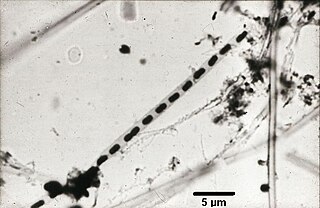Related Research Articles
The Rhodospirillales are an order of Proteobacteria.

Caulobacterales is an order of gram-negative proteobacteria within the alpha subgroup.

The Comamonadaceae are a family of the Betaproteobacteria. Like all Proteobacteria, they are Gram-negative. They are aerobic and most of the species are motile via flagella. The cells are curved rod-shaped.
Acidovorax is a genus of Proteobacteria. All species are facultative. A. avenae causes bacterial fruit blotch on cucurbit crops.
Pelobacteraceae is a bacterial family in the order Desulfuromonadales. The species are anaerobic and have a fermentative metabolism.
Comamonas is a genus of Proteobacteria . Like all Proteobacteria, they are Gram-negative bacteria. Comamonas species are aerobic organisms and motile using bipolar or polar tufts of one to five flagella.
Devosia is a genus of Gram-negative soil bacteria. It is named after the Belgian microbiologist Paul De Vos. They are motile by flagella, the cells are rod-shaped.
In taxonomy, Ahrensia is a genus of the Hyphomicrobiales. Ahrensia is named after the German microbiologist R. Ahrens. The cells are rod-shaped and motile. They are strictly aerobic.
Bergey's Manual of Systematic Bacteriology is the main resource for determining the identity of prokaryotic organisms, emphasizing bacterial species, using every characterizing aspect.
Chelatococcus asaccharovorans is a bacterium from the genus of Chelatococcus.
Blastobacter is a genus of bacteria from the family Nitrobacteraceae. Most of the species originally ascribed to Blastobacter have been transferred to other genera, with Blastobacter henricii as the only remaining valid species. To complicate matters, no type strain is available for Blastobacter henricii, so the entire genus may be dismantled.
Rhodoblastus is a genus of bacteria from the order Hyphomicrobiales.
Aquabacter is an oxidase and catalase-positive genus of bacteria from the family of Hyphomicrobiaceae. It contains only the single species A. spiritensis.
Hyphomicrobium hollandicum is an aerobic bacteria from the genus of Hyphomicrobium which was isolated from soil in California in the US.
Rhodobium orientis is a phototrophic, Gram-negative, rod-shaped and motile bacterium species from the genus of Rhodobium which has been isolated from coastal seawater from Makurazaki in Japan.
Methylopila is a genus of bacteria from the family Methylocystaceae.
"Erythrobacter tepidarius" is a moderately thermophilic and non-motile bacteria from the genus of Erythrobacter which has been isolated from a hot spring in Usami in Japan.
Thiorhodococcus is a Gram-negative genus of bacteria from the family of Chromatiaceae.
Thiorhodococcus minor is a bacterium from the genus of Thiorhodococcus which has been isolated from lagoon sediments from the Arcachon Bay.
Thiorhodovibrio is a Gram-negative genus of bacteria from the family of Chromatiaceae.
References
- 1 2 3 4 5 LPSN lpsn.dsmz.de
- ↑ UniProt
- ↑ Staley, James T.; Brenner, Don J.; Krieg, Noel R. (2006). Bergey's Manual® of Systematic Bacteriology: Volume Two: The Proteobacteria. Springer Science & Business Media. ISBN 9780387292984.
- ↑ Botana, Luis M.; Alfonso, Amparo (2015). Phycotoxins: Chemistry and Biochemistry. John Wiley & Sons. ISBN 9781118500330.